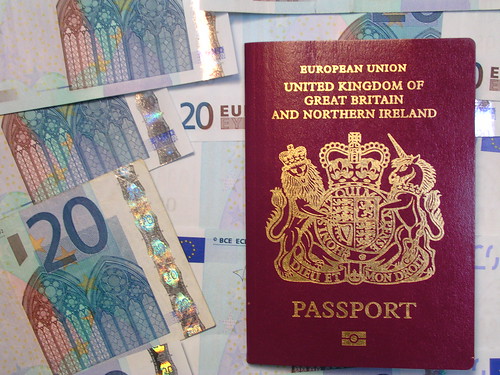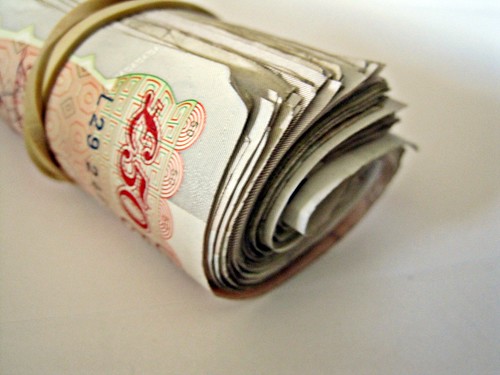Imagine you are coming home after a long day working for your hard earned pay and you enter your home to find a frightening spectacle in the form of a ransacked bedroom. Such a scenario is exactly why many people take certain steps to ensure their important papers and valuables are safely locked away. For some this means using a safety deposit box at your bank because of their 24 hour security. However, there are a few reasons why certain things should be kept in your own home rather than in a bank.
 Photo by Christopher Elison via Flickr
Photo by Christopher Elison via Flickr
Certain items that need protection should also be on hand in case you need them. Also, items in a safety deposit box may not be insured as well as items stolen from your home. Finally, if for some reason you can’t retrieve an important document from the bank, it will be more difficult for someone to get it for you. With a
home safe, you always have easy access, you are insured under your home insurance policy and you can give trusted friends and family access if necessary. Plus, in the event of a break-in or a fire you at least know that some of your most important valuables are nestled securely right where you left them. However, what items need to be kept safe and kept in your home?
You’ll want to Protect Your Documented Identity
Documents that have your personal information like birth certificates, National Insurance cards and passports are important things to keep safe from both thieves and flames. Of course, paper documents are the most vulnerable in the case of a fire but there are plenty of criminals that would like to get their hands on your identity as well. These are also things that you might need to have handy. You will often need these forms when applying for jobs, entering school, getting a driver’s license and many other official purposes. Also, when it comes to official identity documents, it can be a huge bother to replace.
Property Papers Are Especially Important
Documents like deeds and property insurance need to be kept in a secure fire resistant safe, especially considering that you will need those documents if something happens to your home. It is also a good idea to keep any contact information you need to speak with your insurance agent. You may have a rough time of it if those papers are destroyed exactly when you need them most.
Safeguard Your Health and Life Insurance Policies
If you are injured and left incapacitated, in a coma or worse it is good to have your health and life insurance documents and agency contact information in a home safe. That way, a predetermined friend or family member can retrieve the necessary paperwork. If you were to keep insurance policies and information in a safety deposit box it would be difficult for a friend or family member to gain access.
Legal Document Are a Must for Most
For the same reason, any important legal document should be kept at home. Living wills and powers of attorney need to be accessible to the right family members and not to anyone else.
Important Keys to Deposit Boxes, Lockers and More
Keys that you use periodically should be kept in a home safe, so they are there when you need them and safe when you don’t. This is especially true if you do happen to use a safety deposit box. The key is certainly one thing that needs to be kept secure and can’t be put into the box itself.
Pass Codes that Should Not Be Left Out In the Open
Similar to keys, if you keep complicated passwords or codes that are difficult to memorise, write them down and lock them away in a safe. Then you can avoid forgetting them and ensure you are the only one that sees them. If you use a wireless router to provide Wi-Fi to your home, it may be a good idea to keep the security code in a safe to avoid unwanted Wi-Fi guests.
Personal Finance and Other Banking Information
If you are currently in the process of paying off debts you probably have important papers with due dates and contact information that are important to keep safe.
PC Backups
Any CDs, memory sticks or external hard drives that are used to back up photos, videos, documents or any other files from your computer should be safe from damage and theft. There is no point in backing up files if they are in danger of being damaged. If there is a fire and your computer is destroyed at least the information could be salvaged if it is kept in a safe.
Any Physical Spending Money You Can’t Afford to Lose
 Photo by Howard Lake via Flickr
Photo by Howard Lake via Flickr
Cash is certainly something that many people choose to keep in safety deposit boxes, but if you like to keep some spending money around, then a safe is a great option. It is ready and available when you need it and you don’t have to worry about it when you are away.
Fine Jewellery and Pricier Trinkets
It is said that most burglars visit your master bedroom first. Valuable jewellery is one of the primary targets burglars look for during a break in. As opposed to other valuable items in your home like electronics and appliances, jewellery is light and easy to move.
Heirlooms You Want to Make Sure Are Passed On
Old family heirlooms can also be kept out of harm’s way in a safe. Even if the item only holds sentimental value it is good to keep it from being damaged by fire.
Prescriptions and Pharmacy Information
 Photo by e-Magine Art via Flickr
Photo by e-Magine Art via Flickr
It is a good idea to keep your prescriptions and pharmacy contact information in a safe so that they can be retrieved if something happens to your home. However, most people don’t think to keep the actual prescribed medicine locked away. After looking for cash and jewelry in the master bedroom many thieves move onto the medicine cabinet. Expensive pills, especially narcotics, can be sold for a high price. Plus, keeping medicine locked up will keep it out of the hands of curious children.
The amount of time it takes for a fire to consume a home varies, though it typically only burns in one particular area for 10 minutes before burning out or moving on. A good home safe can resist fire for 30 minutes or more. Also, a typical burglar is in and out of a home in 10 minutes or less. So you also want a safe that takes much longer than that to crack. The more time a safe forces a burglar to stay in your home the more likely he is to give up and get out.
 Photo by Christopher Elison via Flickr
Certain items that need protection should also be on hand in case you need them. Also, items in a safety deposit box may not be insured as well as items stolen from your home. Finally, if for some reason you can’t retrieve an important document from the bank, it will be more difficult for someone to get it for you. With a home safe, you always have easy access, you are insured under your home insurance policy and you can give trusted friends and family access if necessary. Plus, in the event of a break-in or a fire you at least know that some of your most important valuables are nestled securely right where you left them. However, what items need to be kept safe and kept in your home?
Photo by Christopher Elison via Flickr
Certain items that need protection should also be on hand in case you need them. Also, items in a safety deposit box may not be insured as well as items stolen from your home. Finally, if for some reason you can’t retrieve an important document from the bank, it will be more difficult for someone to get it for you. With a home safe, you always have easy access, you are insured under your home insurance policy and you can give trusted friends and family access if necessary. Plus, in the event of a break-in or a fire you at least know that some of your most important valuables are nestled securely right where you left them. However, what items need to be kept safe and kept in your home?
 Photo by Howard Lake via Flickr
Cash is certainly something that many people choose to keep in safety deposit boxes, but if you like to keep some spending money around, then a safe is a great option. It is ready and available when you need it and you don’t have to worry about it when you are away.
Photo by Howard Lake via Flickr
Cash is certainly something that many people choose to keep in safety deposit boxes, but if you like to keep some spending money around, then a safe is a great option. It is ready and available when you need it and you don’t have to worry about it when you are away.
 Photo by e-Magine Art via Flickr
It is a good idea to keep your prescriptions and pharmacy contact information in a safe so that they can be retrieved if something happens to your home. However, most people don’t think to keep the actual prescribed medicine locked away. After looking for cash and jewelry in the master bedroom many thieves move onto the medicine cabinet. Expensive pills, especially narcotics, can be sold for a high price. Plus, keeping medicine locked up will keep it out of the hands of curious children.
The amount of time it takes for a fire to consume a home varies, though it typically only burns in one particular area for 10 minutes before burning out or moving on. A good home safe can resist fire for 30 minutes or more. Also, a typical burglar is in and out of a home in 10 minutes or less. So you also want a safe that takes much longer than that to crack. The more time a safe forces a burglar to stay in your home the more likely he is to give up and get out.
Photo by e-Magine Art via Flickr
It is a good idea to keep your prescriptions and pharmacy contact information in a safe so that they can be retrieved if something happens to your home. However, most people don’t think to keep the actual prescribed medicine locked away. After looking for cash and jewelry in the master bedroom many thieves move onto the medicine cabinet. Expensive pills, especially narcotics, can be sold for a high price. Plus, keeping medicine locked up will keep it out of the hands of curious children.
The amount of time it takes for a fire to consume a home varies, though it typically only burns in one particular area for 10 minutes before burning out or moving on. A good home safe can resist fire for 30 minutes or more. Also, a typical burglar is in and out of a home in 10 minutes or less. So you also want a safe that takes much longer than that to crack. The more time a safe forces a burglar to stay in your home the more likely he is to give up and get out.


